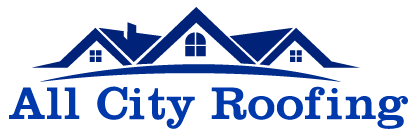5 Types of Flat Roofs Business Owners Should Consider
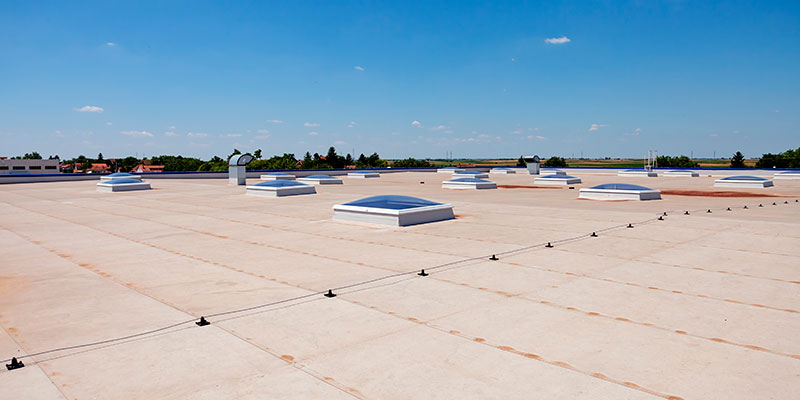
Your business is one of your most essential investments. Naturally, you want to protect it with the right flat roofing system. By learning about the different flat roofing materials, you can choose a solution that offers the best combination of energy efficiency, flat roof durability, and affordability.
Many commercial buildings benefit from flat roofs, from restaurants and retail stores to hospitals and warehouses. In this guide, we’ll explore five types of flat roofs that business owners should consider, helping you make an informed and confident decision about your property.
TPO Roofing: Efficient, Resilient & Eco-Friendly
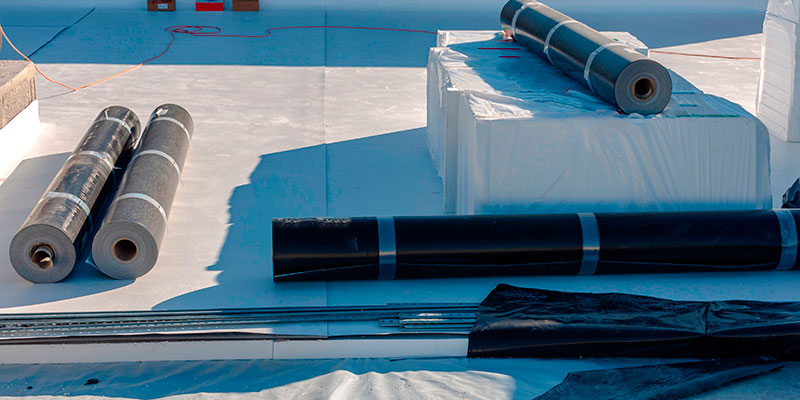
One of the most popular flat roofing systems in the U.S., TPO roofing (Thermoplastic Polyolefin) has been widely used since the 1990s.
This single-ply membrane is made of rubber, ethylene, and propylene. It offers high performance across various climates, making it one of the best flat roofs for Kennewick businesses.
Key Benefits:
– Excellent resistance to tears, punctures, and chemical exposure
– High energy efficiency by reflecting sunlight and reducing cooling costs
– Available in multiple colors like white, grey, and tan
– Highly flexible, accommodating building movement
– TPO roof maintenance is simple and cost-effective
– Fire and wind-resistant
– 100% recyclable material
With a lifespan of 15–20 years for flat roofs, TPO is a wise investment for business owners who prioritize performance and sustainability.
Explore our flat roofing services in Kennewick.
Tar and Gravel Roofing: Classic Strength & Simplicity
Also known as built-up roofing (BUR), tar and gravel roofing is a tried-and-true method used for decades.
This system consists of alternating bitumen and roofing felt layers topped with gravel to protect against UV rays and add weight for wind resistance.
Why Choose Tar and Gravel?
– Affordable flat roof cost compared to some modern systems
– Multi-layered waterproofing for added protection
– Easy to repair and maintain
– Effective at insulating your building and controlling the temperature
– Long-lasting under proper maintenance
Modified Bitumen Roofing: Flexible & Foot-Traffic Friendly
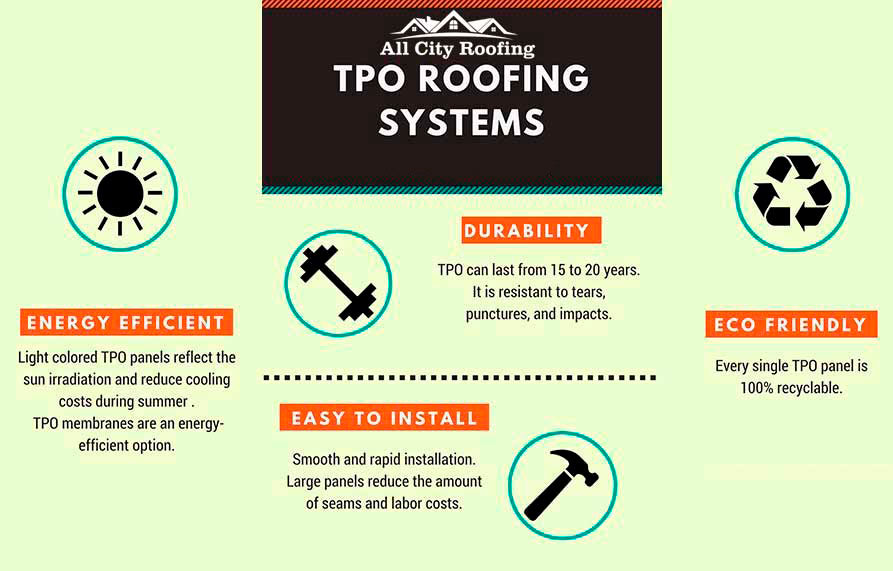
Modified Bitumen roofing blends the strength of BUR systems with modern polymer technology. It’s especially well-suited for flat roofs that experience moderate foot traffic—such as those with HVAC systems or maintenance walkways.
There are two main types:
– APP (Atactic Polypropylene): Reflects UV rays and handles temperature swings well.
– SBS (Styrene-Butadiene-Styrene): Offers rubber-like flexibility and is applied via cold adhesives or heat.
Flat Roof Insulation Benefits Include:
– Superior waterproofing
– Long-term performance and toughness
– Excellent thermal protection for your business
– Moderate flat roof cost and relatively quick installation
EPDM Rubber Roofing: Resilient & Budget-Friendly
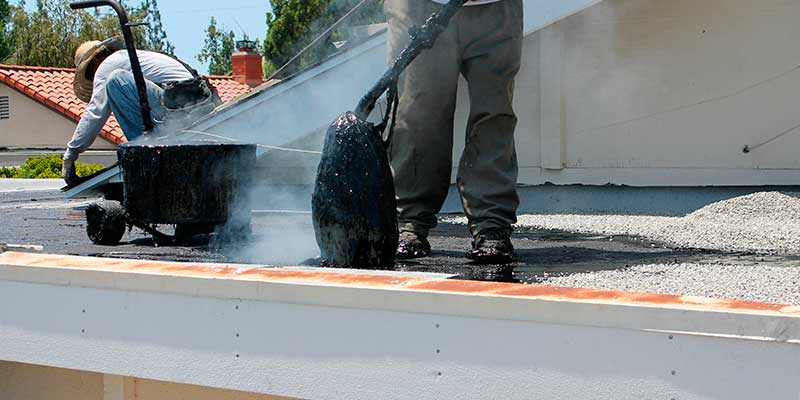
EPDM roofing (Ethylene Propylene Diene Monomer) is a durable rubber membrane known for its simplicity and longevity. It’s ideal for businesses seeking a lightweight, low-maintenance flat roofing solution.
Why EPDM Works:
– Available in black or white for temperature control
– Lightweight yet strong
– Seamless installation in large rolls
– Highly weather- and UV-resistant
– Easy repairs and long-lasting results
With a potential flat roof lifespan of 20–30 years, EPDM is one of the market’s most economical and low-maintenance choices today.
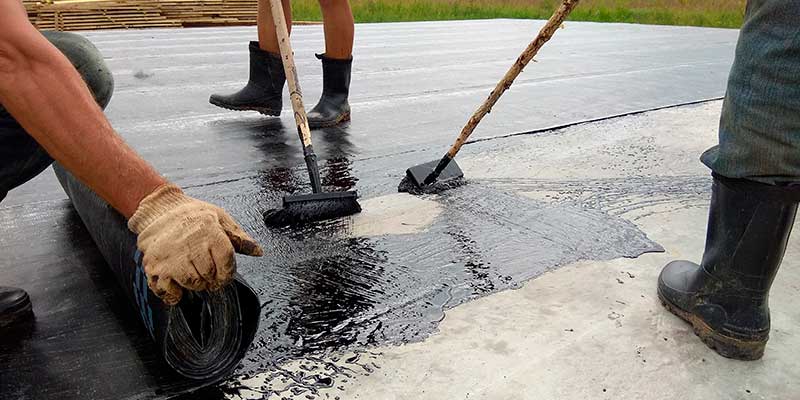
PVC Roofing: Durable, Chemical-Resistant & Energy Efficient
PVC roofing (Polyvinyl Chloride) is a premium single-ply membrane perfect for commercial buildings that need maximum resistance to chemicals or grease—such as restaurants or factories.
Advantages of PVC:
– High energy efficiency through reflective white surfaces
– Excellent fire and wind resistance
– Long-term durability (typically 20+ years)
– Flexible and lightweight
– Chemical and puncture resistant
Need help choosing the right flat roof? Contact us today
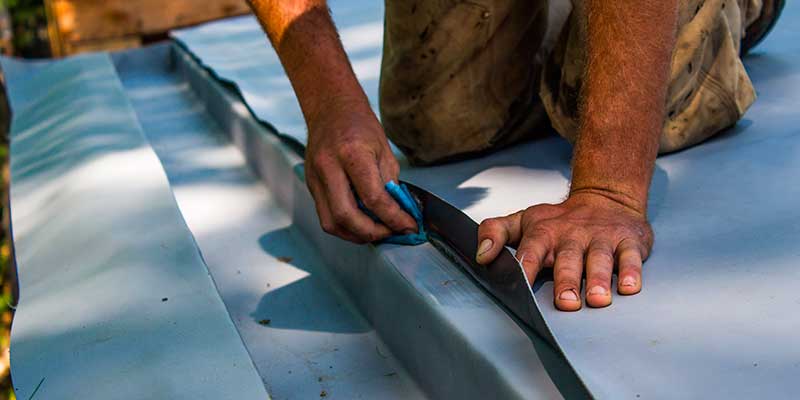
Final Thoughts: Choosing the Best Flat Roof for Your Business
Every commercial property is different. That’s why it’s essential to consider flat roof insulation benefits, climate suitability, lifespan, maintenance needs, and budget when comparing these five types of flat roofs.
Whether upgrading an old roof or building from the ground up, working with an experienced contractor is the key to making a wise investment.
At All City Roofing, we help business owners in Kennewick and surrounding areas find the perfect flat roofing materials for their needs. Our expert team is here to provide honest advice, quality workmanship, and unmatched service.
View our roofing services or get in touch with us today.
Additional Considerations When Choosing a Flat Roof
While the five types of flat roofs we’ve covered offer strong advantages, assessing additional factors that influence performance and value is equally important. Choosing the right roofing system goes beyond just the material—it includes how it’s installed, maintained, and suited to your specific business operations.
For example, if your commercial building houses temperature-sensitive goods or electronic equipment, you’ll benefit more from a roofing system with high insulation properties. TPO or Modified Bitumen with integrated insulation layers would be ideal in this case. Conversely, EPDM might be better if your priority is low upfront cost with dependable performance.
Moreover, businesses in Kennewick should account for local weather patterns. The region experiences hot summers and occasional snowfall, so your flat roof must handle temperature extremes without cracking or blistering. Systems like TPO and PVC provide excellent UV resistance and thermal performance, reducing the heat load on HVAC systems. This directly contributes to energy savings over time.
Maintenance Matters: Ensuring Long-Term Performance
Even the best flat roofs can fail prematurely without regular maintenance. As a business owner, investing in routine inspections and preventative care will extend the lifespan of your roofing system and prevent costly repairs. Flat roofs are especially prone to drainage issues, punctures from foot traffic, and material degradation from constant sun exposure.
A proactive maintenance plan includes:
– Semi-annual inspections by a professional roofing contractor
– Clearing debris from drains and gutters
– Prompt repair of any cracks, blisters, or membrane separations
– Checking for signs of water pooling, which could indicate poor drainage
Maintaining the seams and flashing is critical for TPO and PVC roofs, as these are common points of failure over time. Modified Bitumen systems may require periodic resurfacing, especially if installed in high-traffic zones. By scheduling consistent TPO roof maintenance, you protect your investment and avoid unexpected operational interruptions.
The Role of Installation Quality
The installation quality significantly influences your flat roof’s performance and durability. Poor workmanship can result in water infiltration, reduced insulation effectiveness, and even voided warranties. That’s why working with a licensed and experienced roofing contractor who understands the unique challenges of flat roof systems is essential.
At All City Roofing, our team ensures precision in every detail—from surface preparation to membrane sealing. We also educate our clients about post-installation care, warranty coverage, and energy-saving upgrades. We aim to offer the best flat roofs for Kennewick business owners, tailored to function and aesthetics.
Flat Roof Innovations: Looking Ahead
The flat roofing industry continues to evolve by introducing new materials, green roofing technologies, and advanced coatings that enhance performance. Reflective cool roof systems, for instance, reduce urban heat and improve building energy efficiency. Meanwhile, innovations in self-adhering membranes and moisture barriers are making installations quicker and safer.
Another growing trend is integrating rooftop solar panels, which pair well with flat roofs due to their surface area and orientation. If sustainability is part of your business strategy, discuss these options with your contractor during the planning phase.
Ultimately, the best flat roof for your business aligns with your operational needs, environmental conditions, and long-term goals. Whether you’re looking to upgrade an outdated system or plan for a new build, our team is ready to help you navigate every step.
